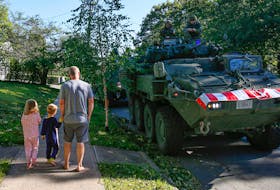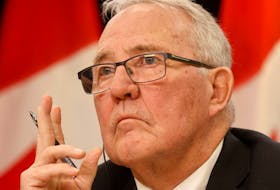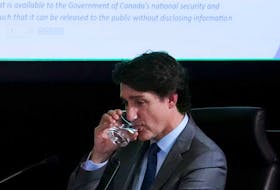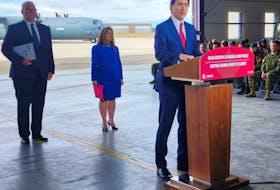The age of international air travel has quickly become the symbol of a bygone era, like steam locomotion or cash.
Most of us haven’t ventured further than the local grocery store in two months, but it turns out more than a quarter of a million passengers have disembarked from international flights at Canadian airports in that time.
Our governments have been telling us to stay home because Canada is in lockdown. Travel has been restricted between provinces — Ottawa residents haven’t been able to visit their cottages in Quebec until this week; people in Pointe-a-la-Croix, Que. still can’t cross the Restigouche River to see family in Campbelltown, N.B.
Yet travelling by air is still a thing. While the volume of travellers is down more than 90 per cent on last year in the seven weeks to May 19, there were still 269,501 arrivals at the four Canadian airports open to international travel (Toronto, Montreal, Calgary and Vancouver).
Sixty-three flights landed at Toronto Pearson on Tuesday, including five from the U.S., eight from Europe, three from Shanghai, one from Beijing, three from Hong Kong, one from Ghana, one from Jamaica and one from Ethiopia.
Some of those may be cargo-only flights, which Pearson’s flight information display screens apparently show as arrivals.
But some flights clearly have passengers.
Who on earth is flying around in these dangerous days? The Canada Border Services Agency is not sharing that information. “Individual and tailored requests are not able to be compiled at this time,” the agency said, when I asked the nationality of passengers.
It is likely many are Canadians who were overseas and are only now returning home. Air Canada said it has operated a number of special flights for the government of Canada, repatriating 6,600 citizens and permanent residents. WestJet has also operated special flights.
The federal government has imposed travel restrictions for foreign nationals entering Canada by air. But an order in council in late March extended a number of exceptions from the ban — 19 of them, in fact. They include temporary foreign workers, foreign students and family members of Canadian citizens or permanent residents.
There are also likely to be a number of travellers who are in transit to other countries — again CBSA does not break out the number.
But it is entirely possible we are continuing to import the disease.
The question about a lockdown that is not a lockdown is particularly relevant as restrictions start to ease. Transmission of COVID-19 from travellers and those exposed to travellers constituted more than 90 per cent of cases in mid-March, before community transmission took hold.
Travel now accounts for 20 per cent of all cases, according to the Public Health Agency, but that will surely rise as trans-border travel returns. Airlines are already planning to increase the frequency on their international routes. Lufthansa has announced it will resume more regular service between Frankfurt and Toronto starting in June.
“Infection on board is unlikely,” the airline said in a news release announcing the resumption. “No concrete cases of transmission on Lufthansa group flights have occurred,” thanks to air filters that remove contaminants such as dust, bacteria and viruses. “Cabin air is cleaner than air people breath outside,” the airline claims. Care to bet your life on that?
It is entirely possible we are continuing to import the disease
It’s a reminder that we are still extremely vulnerable to trans-national diseases. The CBSA says its officers are trained to observe visible signs of illness and they are armed with a foolproof questionnaire: “Do you have a cough, difficulty breathing or feel you have a fever?”
That and a leaflet advising people to isolate for 14 days remains our first and last line of defence at airports.
Meanwhile, provincial police forces are doggedly patrolling inter-provincial bridges and borders to foil family reunions and wily cottagers. One poor blockhead from Ottawa was fined $6,000, after being turned back en route to his cottage in Mont Tremblant and, deciding not to take “no” for an answer, was caught a second time by the same Quebec cop.
It turns out he could have got a return flight to Addis Adaba for half the price.
• Email: [email protected] | Twitter: IvisonJ
Copyright Postmedia Network Inc., 2020








